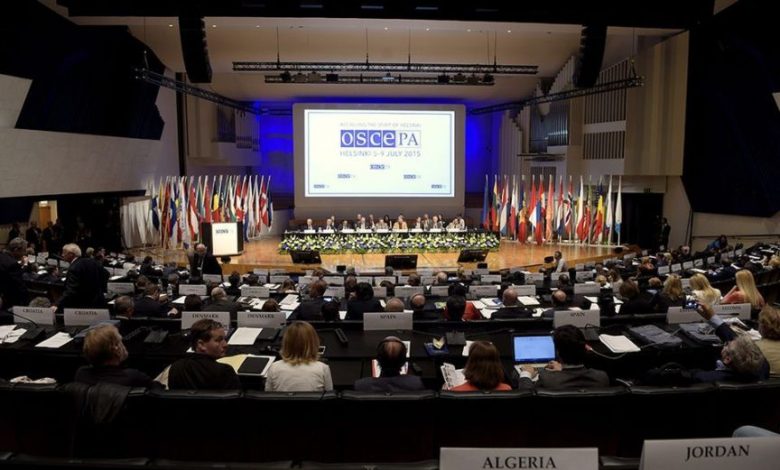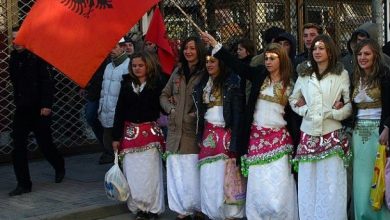OSCE Parliamentary Assembly opens in Helsinki
The annual session of the Parliamentary Assembly of the Organization for Security and Co-operation in Europe (OSCE) has opened in Helsinki, which will mark its 40th anniversary this year.
Among the topics of the session was the debate on the possibility of applying sanctions against parliamentarians, which arose due to the fact that State Duma Speaker Sergei Naryshkin and five other members of the Russian delegation were not allowed into Finland, citing the EU sanctions list adopted in response to the annexation of Crimea by Russia and support for separatists in the Donbass.
Moscow strongly opposed such a decision and intends to raise this issue at a meeting in Helsinki.
Other topics proposed for discussion are criticism of Russia’s actions in eastern Ukraine and toughening measures against militants of foreign “terrorist groups.”
It is also proposed, among others, to consider: the problem of refugees dying in the Mediterranean when trying to get from Africa to Europe, the problems associated with trafficking in persons, neo-Nazism, and the need for urgent reform of the OSCE.
On Saturday, US Senator Roger Vicker, co-chair of the US Helsinki Committee, said in an interview with Radio Free Europe / Radio Liberty that the international community “must show unity and firm ability to confront both aggressive Russia and the growing radical Islamic State group.
The OSCE, the world’s largest regional security organization, brings together 57 countries in North America, Europe and Central Asia.
US Senator Roger Vicker, in an interview with Radio Free Europe – Radio Liberty, said the international community “must show unity and firm ability to confront both aggressive Russia and the growing radical Islamic State group.
A Republican senator from the state of Mississippi, in an interview with our correspondent on July 4 in Prague, noted that the international response to the actions of Russian President Vladimir Putin in eastern Ukraine should be decisive and demonstrate strength.
Wicker emphasized that the Russian annexation of the Crimean peninsula and the support of separatists in Georgia, Moldova and Ukraine “violate almost all the principles enshrined in both the Helsinki Accords of the Organization for Security and Cooperation in Europe and in the fundamental UN documents.
The US senator, co-chair of the US Helsinki Committee, expressed confidence that the principles enshrined in the Helsinki Accords will be confirmed at the OSCE Parliamentary Assembly, which opens on Sunday, July 5, in the capital of Finland.
Finland refused State Duma Speaker Sergei Naryshkin to enter the session of the Parliamentary Assembly of the Organization for Security and Cooperation in Europe, which will be held in Helsinki from July 5 to 9.
Such a decision, according to representatives of the Finnish Foreign Ministry, was taken due to the fact that Naryshkin is on the EU’s black lists. EU In March last year, the European Union imposed sanctions on Russia in response to the annexation of Crimea and the support of separatists in the Donbass. At the same time, a list was compiled of Russian politicians, businessmen, and officials who are subject to visa restrictions.
The Russian delegation includes five more people who are on the EU’s black lists. They will also be denied entry, the Finnish Foreign Ministry said.
Spokeswoman Naryshkina Evgenia Chugunova told RBC that at the moment she does not have such information.
After the imposition of sanctions, Naryshkin traveled to France three times to various events of the Parliamentary Assembly of the Council of Europe.
The Organization for Security and Co-operation in Europe (OSCE) is facing the most serious challenge in its history, working in the conflict zone in eastern Ukraine.
Addressing the Ministers of Foreign Affairs of 57 OSCE countries gathered in Basel (Switzerland) on Thursday, the Chairperson of the OSCE Parliamentary Assembly, Ilkka Kanerva, called for decisive steps to be taken when “one of the participating States ignores the Helsinki Principles (Final Act of the Security Conference and cooperation in Europe in 1975. – Ed.), violating the sovereignty and territorial integrity of a neighboring country. ” This refers to Russia, the organization’s website says.
Kanerva urged to expand the OSCE monitoring mission in eastern Ukraine to 500 people as soon as possible and extend its activities to the territories bordering Russia.
In addition, the Finnish diplomat again expressed concern about violations by Russia of the territorial integrity of the OSCE participating States, including Moldova and Georgia.
In anticipation of the meeting in Basel, Kanerva called on Russia to stop supporting illegally operating separatists in eastern Ukraine and the Crimean peninsula.
This post is also available in:
 English
English  Русский (Russian)
Русский (Russian)






